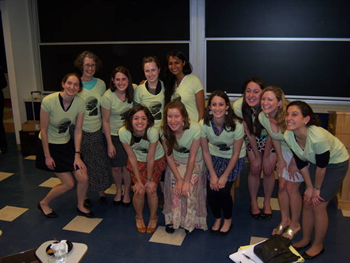Barnard College/Columbia University in New York
Research and writing are an integral part of my work here. I focus on early Jewish and early Christian mystical traditions. At the present I am working on a book that examines ways in which text work (reading, copying, writing and transmitting texts) is related to religious experience. The question that is central to this project is: How did ancient Jewish and Christian scribes and scholars, teachers and interpreters understand their work, experience it as a means of encountering God? I receive support and challenge from my colleagues at the university and neighboring institutions such as Jewish Theological Seminary, as well as in the broader scholarly community in contexts such as the Society of Biblical Literature. The resources of faculties and libraries make this community a vibrant center for the study of early Judaism and early Christianity and the relationship between the two emerging traditions. I work in a secular university. Thus, my work is historical and not theological. Nonetheless, students and colleagues know that I am a sister and outside of the classroom feel comfortable in sharing with me their own search for God. This is often an interfaith encounter at a very deep level. For example, recently a Shiite Muslim colleague recently reflected with me about his experience of Ashura, and the ways in which he has grown in his understanding of his Shiite identity through yearly participation in the ritual. A Jewish student asks: “How can I engage in academic scholarship and still be Orthodox?” Students of all traditions want to talk about prayer. University teaching has great challenges, and the ongoing sociopolitical and financial crisis complicates matters. Nonetheless, I am deeply grateful to work in an environment where people of all religious traditions and none at all can encounter the “other” – and the one who is “Other” -- in the search for meaning.
____________ |
Home | Who we are | What we do | Resources | Join us | News | Contact us | Site map
Copyright Sisters of Our Lady of Sion - General House, Rome - 2011




 For many years my primary ministry has been at Barnard College/Columbia University in New York City where I specialize in teaching early Jewish and early Christian history. My students come from many backgrounds. Most are from a broad spectrum of Judaism or Christianity. Others are from completely secular contexts. In the religion department, the study of Christianity and Judaism occurs in a place that includes Islam, Hinduism, Judaism, Buddhism and other religious traditions. This makes for a very rich environment in which to study and teach. For example, on an ordinary day, two of us – a specialist in Islam and myself -- wandered into the office of a Jewish colleague and found ourselves discussing narratives about Jesus in early Christianity and in the Qu’ran and the ways in which those account might echo various early Jewish traditions.
For many years my primary ministry has been at Barnard College/Columbia University in New York City where I specialize in teaching early Jewish and early Christian history. My students come from many backgrounds. Most are from a broad spectrum of Judaism or Christianity. Others are from completely secular contexts. In the religion department, the study of Christianity and Judaism occurs in a place that includes Islam, Hinduism, Judaism, Buddhism and other religious traditions. This makes for a very rich environment in which to study and teach. For example, on an ordinary day, two of us – a specialist in Islam and myself -- wandered into the office of a Jewish colleague and found ourselves discussing narratives about Jesus in early Christianity and in the Qu’ran and the ways in which those account might echo various early Jewish traditions.